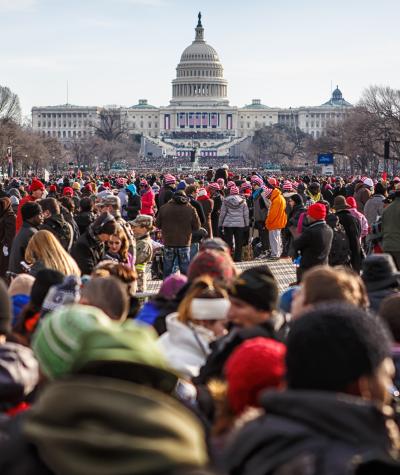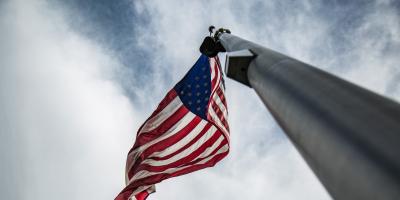The exorbitant price of inaugurations — and the fact that inaugural committees can accept unlimited donations, as well as corporate money — make them an ideal means for wealthy special interests to buy political access and influence, ultimately drowning out the voices of everyday Americans.
For example, according to new disclosures, the cryptocurrency industry collectively donated nearly $16 million to President Donald Trump’s inaugural committee, after pouring hundreds of millions into the 2024 campaign cycle.
Just months later, President Trump is holding exclusive dinners with the industry’s biggest executives and investors, including one where attendees reportedly spent over $1 million on Trump’s $TRUMP cryptocurrency for the chance to attend.
Since Trump’s inauguration, we’ve seen him take several measures to benefit the industries and companies that cut multimillion dollar checks for his celebration.
Even worse, while some corporations and their top executives have publicly exchanged big money for access to the new administration, others who wanted to avoid public scrutiny exploited pathways to keep their spending secret.
That means the public doesn’t even know everyone who spent big money to get their thoughts in the new president’s ear — a recipe for potential corruption.
Presidential Inaugurations Are a Unique Opportunity for Big Donors to Buy Access
Donating to a president’s inaugural committee is a highly effective way for uberwealthy individuals and big corporations to win political favor. Unlike contributions to a presidential campaign, there is no limit to how much money an individual or corporation can donate to an inaugural committee.
Moreover, inaugural committee donations are a sure bet; donors know their money is going to the person who will be sitting in the Oval Office.
While previous presidents have typically adopted self-imposed limitations on their inaugural fundraising — President Barack Obama capped individual donations to his 2009 inauguration at $50,000 and President George W. Bush capped them at $250,000 — Trump did not.
On the contrary, Trump unabashedly marketed his 2025 inauguration as an influence-buying free-for-all, even promising a “candlelight dinner” opportunity to million-dollar donors. Trump ultimately raised over $232 million for his inauguration — more than double the figure he raised in 2017.
Wealthy Special Interests Are Successfully Swaying the President
In return for their hefty donations, President Trump is awarding wealthy special interests with decision-making that benefits their bottom lines instead of the American people’s.
The inaugural committee’s largest donor, Pilgrim’s Pride Corporation — a poultry producer that gave $5 million — benefited from a March 2025 Department of Agriculture waiver that allowed it to maintain higher production-line speeds at the potential expense of worker safety.
In April, Pilgrim’s Pride’s parent company also received permission from the Securities and Exchange Commission to be listed on the New York Stock Exchange — something it had been trying, unsuccessfully, to achieve for years.
The cryptocurrency industry was one of the biggest special interest donors, providing about $16 million to the inaugural committee, on top of its massive spending in support of Trump and his preferred candidates in the 2024 election.
In return, Trump has generously rewarded the crypto sector by appointing an industry-friendly “crypto czar,” who donors at a “Crypto Inaugural Ball” could meet if they purchased a $100,000 VIP ticket; appointing other high-ranking officials sympathetic to crypto; and rolling back a Biden-era executive order that the industry disfavored.
Perhaps most significantly, the Trump administration also has effectively stopped enforcing securities laws against crypto companies, including dropping long-running legal battles against crypto firms like Ripple Labs and Robinhood Markets.
Tech companies preparing for impending legislative battles over content moderation and antitrust enforcement, as well as government contractors like Boeing that depend on the executive branch for their profits, likewise opened their pocketbooks, seeing much to gain from a positive relationship with Trump.
Even wealthy individuals eyeing ambassadorships and positions in the executive branch gave generously from their personal funds. Donors named to government positions gave about $16.5 million in total, and in one particularly egregious situation, Warren Stephens was nominated as ambassador to the United Kingdom on the same day that he donated $4 million to the inaugural committee.
These public, seven-figure donations send a clear message that wealthy corporations and individuals are working to buy political goodwill for the next four years — a concerning sign of how corruption may continue to play out in the second Trump administration.
Dark Money in Inaugural Committees
Not all donations to Trump’s inaugural committee were as public — millions were routed through “dark money” groups.
Dark money refers to political spending where the true sources of the funds are concealed from the public, often through the use of a corporate shell or conduit. Wealthy special interests frequently use dark money to accrue political influence while concealing their actions from voters.
Dark money groups, most commonly 501(c)(4) organizations that aren’t required to disclose their donors, provide a pathway for this secret spending. Many of these groups played a significant role in Trump’s inauguration.
The 2025 Trump inaugural committee’s donor list includes both opaque nonprofit organizations and apparent shell companies. For example, mysteriously named nonprofit organizations like Americans for Pharma Reform and Election Freedom Inc made six and seven-figure donations. An organization named Axe Capital — also the name of a fictional company from the TV show “Billions” — made a $250,000 donation and reported a UPS store as its address, effectively guaranteeing that its money would remain untraceable.
Because dark money eliminates transparency, the public may never know whether the administration is rewarding those behind these donations with special favors.
Unlimited spending in inaugural funding poses a clear risk of corruption: With virtually no rules or limits on how inauguration funds can be spent, they are ripe for abuse.
For instance, Trump’s previous inaugural committee settled a case in 2022 brought by the D.C. attorney general, which accused the committee of grossly overpaying Trump-owned properties that held inauguration events for their event space — ultimately enriching Trump personally.
This time around, Trump has again directed inauguration funds down pathways that ultimately led to his bank account. A chunk of all official inaugural merchandise purchases reportedly went to a leadership PAC, which Trump previously used to pay his personal expenses, such as his mounting legal fees.
Accountability Starts on Day One
As elections become more expensive, it is more important than ever to have transparency on who is paying for access to our politicians.
The inaugural committee, something that was originally meant to help fund the celebration of a peaceful transfer of power, has become yet another avenue for big money and secret spending to drown out the voices of everyday Americans.
Congress should act now to support legislation that would prevent inaugural committees from being a conduit for megadonors and secret spending. The Protecting Our Democracy Act would help protect transparency and accountability by placing a cap on individual donations and requiring disclosure reports that would provide Americans with timely information on who is donating to an inaugural committee.
Just like we have done in past inaugurations, Campaign Legal Center has been keeping a close eye on how inaugural committees have undermined transparency and accountability in our democracy. With your support, we will continue to demand transparency and accountability that prevents wealthy special interests from paying their way to the White House.



